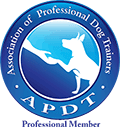Archived OLDT :: Housetraining
Housesoiling: Why Do Dogs Do It?
There are various reasons why a dog might soil in the house. If your dog has been very reliable for
a long time and is suddenly making mistakes, he might have a medical problem such as urolithiasis or
giardia. Your vet can treat these with medication and dietary adjustment and most likely things will
go back to normal. Sometimes, however, a dog can develop the bad habit of going inside even after
the discomfort of the actual illness has been resolved. In this case, you might have to give him a
housetraining refresher course.
In geriatric dogs, house-soiling might be a symptom of canine cognitive dysfunction syndrome (CDS).
Keep an eye out for other indications that this is the problem. A helpful acronym for remembering
its symptoms is DISH: Disorientation, Interaction changes with the family,
Sleep/wake cycle changes,
and House-soiling. There are medications and special diets that can slow the progression of CDS,
often called doggie Alzheimer's.
If your dog eliminates inside only when you're away or urinates when he receives attention,
he might be either suffering from separation anxiety or urinating submissively. These are
problems that a trainer/behaviorist can help you to solve.
Oh, and there's also a very simple reason why a dog might go inside: he just hasn't thoroughly
learned not to soil in the house yet! Which brings us to Housetraining 101...
The Principles of Housetraining
The thing to remember is that the process of housetraining won't last forever! Someday in the
not too distant future, your dog will be perfectly housetrained and accidents will be a thing of
the past! But to get there, you'll need to be vigilant during the training process. Here's how:
- One of your best friends during housetraining is the leash. While inside and not crated, have your pup
tethered to you at all times! Don't give him the opportunity to make a mistake by allowing him
to wander around on his own. Should you notice any of the behaviors that precede elimination, such as
circling or sniffing, get him outside fast!
Note: The other lovely side-effect of this is that your dog becomes comfortable staying at your side; it's great for relationship-building. - Your other best friend is the crate. Your dog won't potty where he sleeps, so his crate should be large enough for him to stand and lie down comfortably but not so large that he can lie down at one end and potty at the other. When you can't attend to your pup, crate him.
- When he goes in the right place, throw a puppy party! As he eliminates, softly say "Good boy", and when he's finished, offer him his favorite treat and make a big fuss over him! It's due payment for his doing the right thing. Eventually you can fade the rewards but, at the start, make sure you let him know how much you appreciate his good behavior!
- If an accident does happen, do not scold him! More likely than not, rather than learning not to go inside he'll learn it's best to hide under the couch when he needs to go. It can also make him afraid to go in front of you altogether, even outside. If you catch him in the act, try to interrupt him, then get him outside. But, if it's after the fact, chalk that one up to poor supervision and move on. A lesson learned!




